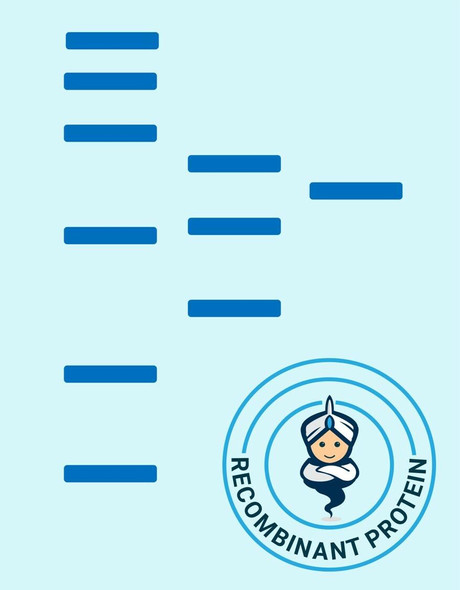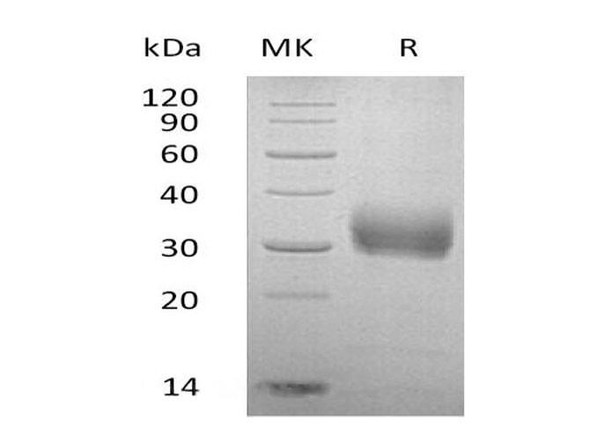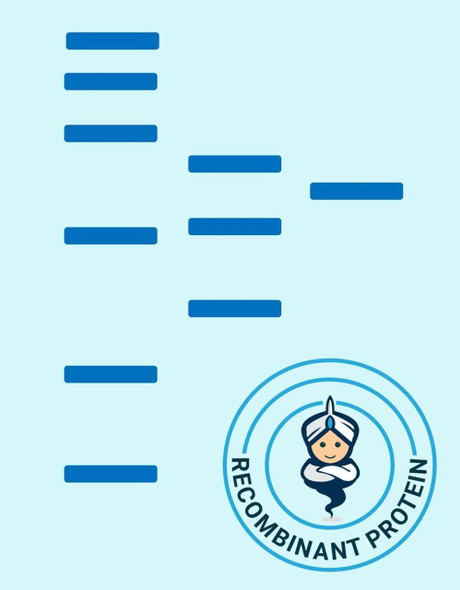Description
| Product Name: | Human SOST Recombinant Protein |
| Product Code: | RPPB4781 |
| Size: | 10µg |
| Species: | Human |
| Target: | SOST |
| Synonyms: | Sclerostin, SOST, CDD, VBCH. |
| Source: | Escherichia Coli |
| Physical Appearance: | Filtered White lyophilized (freeze-dried) powder. |
| Formulation: | SOST filtered (0.4 �m) and lyophilized from 0.5mg/ml in 0.03M Acetate buffer pH-4.0. |
| Solubility: | It is recommended to add 0.1M Acetate buffer pH-4 to prepare a working stock solution of approximately 0.5mg/ml and let the lyophilized pellet dissolve completely. For conversion into higher pH value, we recommend intensive dilution by relevant buffer to a concentration of 10�g/ml. In higher concentrations the solubility of this antigen is limited. SOST is not sterile! Please filter the product by an appropriate sterile filter before using it in the cell culture. |
| Stability: | Store lyophilized protein at -20°C. Aliquot the product after reconstitution to avoid repeated freezing/thawing cycles. Reconstituted protein can be stored at 4°C for a limited period of time; it does not show any change after two weeks at 4°C. |
| Purity: | Greater than 90.0% as determined by SDS-PAGE. |
| Amino Acid Sequence: | MKHHHHHHASQGWQAFKNDA TEIIPELGEY PEPPPELENN KTMNRAENGG RPPHHPFETK DVSEYSCREL HFTRYVTDGP CRSAKPVTEL VCSGQCGPAR LLPNAIGRGK WWRPSGPDFR CIPDRYRAQR VQLLCPGGEA PRARKVRLVA SCKCKRLTRF HNQSELKDFG TEAARPQKGR KPRPRARSAK ANQAELENAY |
Sclerostin (SOST) is a secreted glycoprotein with a C-terminal cysteine knot-like (CTCK) domain and sequence similarity to the DAN (differential screening-selected gene aberrative in neuroblastoma) family of bone morphogenetic protein (BMP) antagonists. Sclerostin functions as a negative regulator of bone growth, by inhibiting bone formation. SOST is widely expressed at low levels, with highest levels in the bone, cartilage, kidney, liver, bone marrow and primary osteoblasts differentiated for 21 days. SOST gene defects cause sclerosteosis and bone dysplasia.
SOST Human Recombinant produced in E.Coli is a single, non-glycosylated, polypeptide chain (a.a 24-213) containing 200 amino acids including a 10 a.a N-terminal His tag. The total molecular mass is 22.8kDa (calculated).
| UniProt Protein Function: | SOST: Negative regulator of bone growth that acts through inhibition of Wnt signaling and bone formation. Defects in SOST are the cause of sclerosteosis type 1 (SOST1). An autosomal recessive sclerosing bone dysplasia characterized by a generalized hyperostosis and sclerosis leading to a markedly thickened skull, with mandible, ribs, clavicles and all long bones also being affected. Due to narrowing of the foramina of the cranial nerves, facial nerve palsy, hearing loss and atrophy of the optic nerves can occur. Sclerosteosis is clinically and radiologically very similar to van Buchem disease, mainly differentiated by hand malformations and a large stature in sclerosteosis patients. Defects in SOST are a cause of van Buchem disease (VBCH). An autosomal recessive sclerosing bone dysplasia characterized by endosteal hyperostosis of the mandible, skull, ribs, clavicles, and diaphyses of the long bones. Affected patients present a symmetrically increased thickness of bones, most frequently found as an enlarged jawbone, but also an enlargement of the skull, ribs, diaphysis of long bones, as well as tubular bones of hands and feet. The clinical consequence of increased thickness of the skull include facial nerve palsy causing hearing loss, visual problems, neurological pain, and, very rarely, blindness as a consequence of optic atrophy. Serum alkaline phosphatase levels are elevated. A 52 kb deletion downstream of SOST results in SOST transcription suppression causing van Buchem disease. Defects in SOST are a cause of craniodiaphyseal dysplasia autosomal dominant (CDD). A severe bone dysplasia characterized by massive generalized hyperostosis and sclerosis, especially involving the skull and facial bones. The sclerosis is so severe that the resulting facial distortion is referred to as 'leontiasis ossea' (leonine faces) and the bone deposition results in progressive stenosis of craniofacial foramina. Respiratory obstruction due to choanal stenosis compromises the clinical outcomes of affected patients. Heterozygous mutations located in the secretion signal of the SOST gene prevent sclerostin secretion and can be responsible for craniodiaphyseal dysplasia. Belongs to the sclerostin family. 2 isoforms of the human protein are produced by alternative splicing. |
| UniProt Protein Details: | Protein type:Secreted; Secreted, signal peptide Chromosomal Location of Human Ortholog: 17q11.2 Cellular Component: extracellular matrix; extracellular region Molecular Function:protein binding; transcription factor binding Biological Process: negative regulation of BMP signaling pathway; negative regulation of protein complex assembly; positive regulation of transcription, DNA-dependent; response to mechanical stimulus Disease: Craniodiaphyseal Dysplasia, Autosomal Dominant; Hyperostosis Corticalis Generalisata; Sclerosteosis 1 |
| NCBI Summary: | Sclerostin is a secreted glycoprotein with a C-terminal cysteine knot-like (CTCK) domain and sequence similarity to the DAN (differential screening-selected gene aberrative in neuroblastoma) family of bone morphogenetic protein (BMP) antagonists. Loss-of-function mutations in this gene are associated with an autosomal-recessive disorder, sclerosteosis, which causes progressive bone overgrowth. A deletion downstream of this gene, which causes reduced sclerostin expression, is associated with a milder form of the disorder called van Buchem disease. [provided by RefSeq, Jul 2008] |
| UniProt Code: | Q9BQB4 |
| NCBI GenInfo Identifier: | 20140220 |
| NCBI Gene ID: | 50964 |
| NCBI Accession: | Q9BQB4.1 |
| UniProt Secondary Accession: | Q9BQB4,Q495N9, |
| UniProt Related Accession: | Q9BQB4 |
| Molecular Weight: | 24,264 Da |
| NCBI Full Name: | Sclerostin |
| NCBI Synonym Full Names: | sclerostin |
| NCBI Official Symbol: | SOST�� |
| NCBI Official Synonym Symbols: | CDD; VBCH; DAND6; SOST1�� |
| NCBI Protein Information: | sclerostin |
| UniProt Protein Name: | Sclerostin |
| Protein Family: | Sclerostin |
| UniProt Gene Name: | SOST�� |
| UniProt Entry Name: | SOST_HUMAN |






